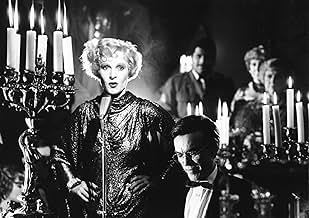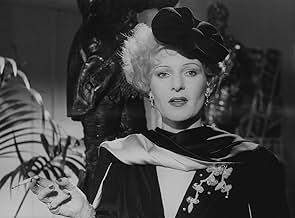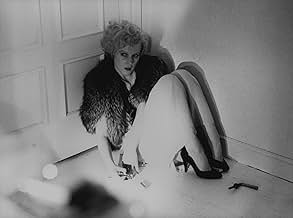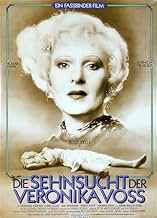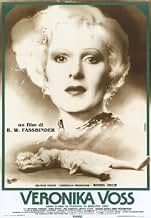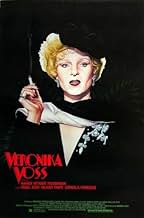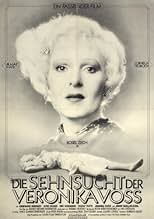CALIFICACIÓN DE IMDb
7.6/10
8.1 k
TU CALIFICACIÓN
La vida de Sybille Schmitz, que alcanzó la fama bajo el régimen nazi, pero cuya carrera quedó destruida después.La vida de Sybille Schmitz, que alcanzó la fama bajo el régimen nazi, pero cuya carrera quedó destruida después.La vida de Sybille Schmitz, que alcanzó la fama bajo el régimen nazi, pero cuya carrera quedó destruida después.
- Dirección
- Guionistas
- Elenco
- Premios
- 4 premios ganados y 4 nominaciones en total
Günther Kaufmann
- G.I.
- (as Günter Kaufmann)
- …
- Dirección
- Guionistas
- Todo el elenco y el equipo
- Producción, taquilla y más en IMDbPro
Opiniones destacadas
A man runs into a pretty but aging woman in the middle of a rainstorm. He politely protects her from the downpour with his umbrella, and even lifts her over a fence so she can get to her bus. He also gets on the bus, and, beginning to pant, she declares that she can't go near anyone else on the bus, because she's a famous actress and she'll be thronged. The other passengers on the bus look up at the exasperated woman, but don't pay her any more mind than that. A bit later, the woman proudly tells the man that she is Veronika Voss, and all he can do is politely nod. She hasn't been in a movie for three years, and hasn't been in a good one for longer than that. Veronika has to try really hard to pin the man, Robert, down and seduce him, and even when she accomplishes this feat he doesn't seem particularly interested. Robert's interest does grow when he begins to discover some nasty secrets about her life, notably that she is addicted to morphine. A strange doctor seems to be little more than a local drug dealer when he begins to look into the situation.
The plot is decent; it would have been a really good one for a classic Hollywood film starring Joan Crawford or Bette Davis or someone like that. Its greatest worth is in the performance of Rosel Zech, who has the titular role. Cornelia Froboess as Robert's girlfriend and Annemarie Düringer as the wicked doctor are also good. The character of Robert is never very interesting. The black and white cinematography (Xaver Schwarzenberger) and the unconventional score (Peer Raben) are very good. The tape I watched was not in a very good condition, so I may have liked it more if I had seen a better copy. 8/10.
The plot is decent; it would have been a really good one for a classic Hollywood film starring Joan Crawford or Bette Davis or someone like that. Its greatest worth is in the performance of Rosel Zech, who has the titular role. Cornelia Froboess as Robert's girlfriend and Annemarie Düringer as the wicked doctor are also good. The character of Robert is never very interesting. The black and white cinematography (Xaver Schwarzenberger) and the unconventional score (Peer Raben) are very good. The tape I watched was not in a very good condition, so I may have liked it more if I had seen a better copy. 8/10.
In the 50's, in a rainy night in Germany, the sports reporter Robert Krohn (Hilmar Thate) offers his umbrella to the former successful UFA actress Veronika Voss (Rosel Zech) but he does not recognizes her. Later she calls him inviting for a drink, and he finds an unstable and decadent actress living in her past success. In a mixed sensation of love, empathy and curiosity, Robert has an affair with Veronika, and discloses a dangerous gang leaded by Dr. Marianne Katz (Annemarie Düringer) that addicts wealthy patients in morphine to get their fortune when they die.
"Die Sehnsucht der Veronika Voss" is a melancholic, bitter and depressive tale based on the reality of an era, and the association with "Sunset Boulevard" is immediate. The story is based on the last years of the German actress Sybille Schmitz (1909-1955), who died due to an overdose of sleeping pills. The performance of Rosel Zech is impressive, showing the glamour of a former star in the Nazi period and the depression of an addicted woman in the 50's. Hilmar Thate is also perfect in the role of a simple innocent man that faces a greedy world of pain and death. The magnificent cinematography in black and white, using perfectly light and shadows, is homage to the Golden Age of Hollywood. My vote is eight.
Title (Brazil): "O Desespero de Veronika Voss" ("The Despair of Veronika Voss")
"Die Sehnsucht der Veronika Voss" is a melancholic, bitter and depressive tale based on the reality of an era, and the association with "Sunset Boulevard" is immediate. The story is based on the last years of the German actress Sybille Schmitz (1909-1955), who died due to an overdose of sleeping pills. The performance of Rosel Zech is impressive, showing the glamour of a former star in the Nazi period and the depression of an addicted woman in the 50's. Hilmar Thate is also perfect in the role of a simple innocent man that faces a greedy world of pain and death. The magnificent cinematography in black and white, using perfectly light and shadows, is homage to the Golden Age of Hollywood. My vote is eight.
Title (Brazil): "O Desespero de Veronika Voss" ("The Despair of Veronika Voss")
Like many other Fassbinder films "Die Sehnsucht der Veronika Voss" tells about a decline and is very depressing. It is a visually stunning film that shows how much Fassbinder admired the classical Hollywood cinema and especially the films of Douglas Sirk. Like the films of his idol this film is stylish and artificial to an extreme extent which creates quite a distance between itself and the audience. Probably an even greater distance, since the style and the artificiality are used more consciously here, even as a instrument of alienation. So it is more fascinating than touching or even moving and might leave one even cold. Nevertheless the story is intriguing and it really tells something about the post war society in West Germany, so the film is interesting and even fascinating to watch. The scene where Rosel Zech as Veronika sings "Memories Are Made Of This" is very haunting, a gem.
A famous German actress, Veronika Voss (Rozel Zech) in her forties tries to revive her career while struggling with alcohol and drugs in the final chapter to Fassbinder's trilogy about collapse of the West German postwar dream. The film was inspired by the tragic life of famous UFA actress, Sybille Schmitz (1909-1955). She began her career in the films by the giants such Georg Wilhelm Pabst and Carl Theodor Dreyer and soon became one of Germany's beloved actress. Everything changed during the WWII and especially after its end.
Fassbinder's film which was shot in black and white visually is very impressive. "Light and shadows are two cinema's best secrets" says Veronika in the movie and light and shadows make the film a joy to behold. I like it but I think it is the weakest part of the trilogy perhaps because "Lola" and "Maria Braun" are so strong. I found the documentary about Sybille Schmitz, "Dances with Death" which is included on Criterion DVD much more compelling.
Veronika - 7/10 Dances with Death 8.5/10
Fassbinder's film which was shot in black and white visually is very impressive. "Light and shadows are two cinema's best secrets" says Veronika in the movie and light and shadows make the film a joy to behold. I like it but I think it is the weakest part of the trilogy perhaps because "Lola" and "Maria Braun" are so strong. I found the documentary about Sybille Schmitz, "Dances with Death" which is included on Criterion DVD much more compelling.
Veronika - 7/10 Dances with Death 8.5/10
10hasosch
Rainer Werner Fassbinder's second-but-last film does not show primarily the life and downfall of the UFA-star Sybille Schmitz, but gives, at the hand of the Schmitz-inspired, yet fictive character Veronika Voss an unvarnished and hopeless picture of the Bundesrepublik Germany in the 50ies. Part of Fassbinder's "BRD-Trilogy", it is also one of his 4 "women"-films, besides "Lola", "Maria Braun", and "Lili Marleen".
It is hard to say if the main focus of this movie is the former UFA-star Veronika Voss or the sports reporter Robert Krohn. One rainy night, he meets, in a little forest amidst of Berlin, a crying little bundle of mensch who seems to have completely lost her orientation. She is not so much thankful for his help but astonished that he does not recognize her: the great Veronika Voss. After he accompanies the woman to her door, she continues to occupy his mind. He asks his older colleagues who confirm him that she was once a movies' super-star, but now forgotten, divorced, impoverished, addicted and out of work. Soon, they meet again, and between Krohn, who is in a steady liaison, and Veronika, who sees in him one of her once many admirers, a very problematic love story starts which costs two humans' lives, leaves an investigative mind back in despair, discloses the corruption between medicine and politics and portrays the deterrent situation in the post-war German film industry which used his former flagships as fuel.
R.W. Fassbinder got for this films the "Golden Bear" out of the hand of Jimmy Stewart who was his friend for many years. Fassbinder had been nominated for the highest German film price since a long time, but it was Stewart who realized that soon it might come too late. Fassbinder passed away only a few days after having received the Golden Bear.
It is hard to say if the main focus of this movie is the former UFA-star Veronika Voss or the sports reporter Robert Krohn. One rainy night, he meets, in a little forest amidst of Berlin, a crying little bundle of mensch who seems to have completely lost her orientation. She is not so much thankful for his help but astonished that he does not recognize her: the great Veronika Voss. After he accompanies the woman to her door, she continues to occupy his mind. He asks his older colleagues who confirm him that she was once a movies' super-star, but now forgotten, divorced, impoverished, addicted and out of work. Soon, they meet again, and between Krohn, who is in a steady liaison, and Veronika, who sees in him one of her once many admirers, a very problematic love story starts which costs two humans' lives, leaves an investigative mind back in despair, discloses the corruption between medicine and politics and portrays the deterrent situation in the post-war German film industry which used his former flagships as fuel.
R.W. Fassbinder got for this films the "Golden Bear" out of the hand of Jimmy Stewart who was his friend for many years. Fassbinder had been nominated for the highest German film price since a long time, but it was Stewart who realized that soon it might come too late. Fassbinder passed away only a few days after having received the Golden Bear.
¿Sabías que…?
- TriviaBased on the true story of German film star Sybille Schmitz.
- ErroresThe film is set in 1955 but the song "The Battle of New Orleans" by Johnny Horton, released in 1959, is heard on the radio a number of times.
- Citas
Dr. Marianne Katz: Artists are different from ordinary people. They are wrapped up in themselves, or simply forgetful.
Selecciones populares
Inicia sesión para calificar y agrega a la lista de videos para obtener recomendaciones personalizadas
- How long is Veronika Voss?Con tecnología de Alexa
Detalles
- Fecha de lanzamiento
- País de origen
- Idiomas
- También se conoce como
- Veronika Voss
- Locaciones de filmación
- Productoras
- Ver más créditos de la compañía en IMDbPro
Taquilla
- Presupuesto
- DEM 2,600,000 (estimado)
- Total en EE. UU. y Canadá
- USD 8,144
- Fin de semana de estreno en EE. UU. y Canadá
- USD 11,623
- 16 feb 2003
- Total a nivel mundial
- USD 8,158
- Tiempo de ejecución1 hora 44 minutos
- Color
- Mezcla de sonido
- Relación de aspecto
- 1.66 : 1
Contribuir a esta página
Sugiere una edición o agrega el contenido que falta

Principales brechas de datos
By what name was Die Sehnsucht der Veronika Voss (1982) officially released in India in English?
Responda
